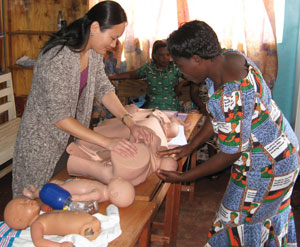Fogarty Fellow Dr Jennifer Tang researches women's health in Malawi
September / October 2014 | Volume 13, Issue 5

Photo courtesy of Dr. Jennifer Tang
Dr. Jennifer Tang aims to help improve the health
prospects of women in Malawi as a researcher as
well as an obstetrician-gynecologist.
By Cathy Kristiansen
Dr. Jennifer Tang remembers a 19-year-old patient arriving at the hospital in Malawi desperately ill, her uterus ruptured and severely infected, and her baby dead. Although Tang's surgical team rushed into action, the patient died a few hours later. Tang said what compounded the tragedy was how the woman's family had taken her to two other health centers, only to be turned away due to lack of specialists and equipment for a Cesarean section. "She had done the right thing, seeking help, but faced multiple barriers and ended up dying," Tang said. "Those kinds of stories stay with me."
Malawi has a very high maternal death rate - one in 34, according to the World Bank - and the reasons are not fully understood. Many factors might contribute, aside from the lack of medical specialists, including a high total fertility rate of 5.7 live births per woman, low modern contraceptive use and a high HIV prevalence - 11 percent of adults.
Tang aims to help improve the health prospects of women in Malawi as a researcher as well as an obstetrician-gynecologist. Receiving a Fogarty fellowship enabled her to explore making research part of her career. Fogarty's Global Health Program for Fellows and Scholars provides one-year, mentored clinical research experiences overseas for postdoctoral Fellows and pre-doctoral Scholars, helping to foster the next generation of clinical investigators and to build global health partnerships between U.S. and other researchers and institutions.
"The fellowship made me a better physician-scientist," Tang said. "It gave me protected time and research funding so that I could focus on learning how to develop and implement clinical research projects in this resource-limited setting."
For her fellowship project, she assessed family planning knowledge, attitudes and practices among 634 postpartum women. Although more than 80 percent of the women were planning to use one of two long-term, reversible contraceptives to avoid another pregnancy, three months later very few women had followed through. Only 14 percent used a hormonal implant and 1 percent had an intrauterine device (IUD).
Tang also found the largest influence driving whether women were on a contraceptive was having correct knowledge about their safety. She hopes to design an educational intervention for antenatal and postpartum women on the safety of IUDs and implants.
Now, Tang has secured funding to expand her research in Malawi through 2017, including a Fogarty career development award and grants through the University of North Carolina Center for AIDS Research, World Bank, CDC, and the Bill and Melinda Gates Foundation. "The Fogarty fellowship gave me the on-the-ground experience I needed to successfully continue and expand my research work, as well as mentor other Fogarty Fellows," she said, adding that in time, she hopes to apply for a multiyear NIH award.
Tang's newest project is investigating whether the common progestin-only injectable contraceptive, depot medroxyprogesterone acetate (DMPA), might raise the risk of HIV infection - unlike contraceptives using different forms of progestin - as some studies suggest. "The biological reason for this potential association is not well understood, although it may be related to changes in genital tract immunology and microbiology caused by DMPA," Tang said. She will evaluate inflammation indicators and other changes in women at risk for HIV after they embark on either DMPA or another progestin contraceptive.
During her fellowship and subsequently, Tang has helped build Malawi's medical capacity. She staffs and conducts training in a cervical cancer screening clinic and instructs residents in Malawi's first obstetrics-gynecology residency program, which she helped to found in September 2013. She mentors students and has participated in additional research projects, including a cross-sectional study evaluating the characteristics of women with obstetric fistula.
As she develops her career and contributes to capacity building in Malawi, she hopes that in the future, people like the young woman in labor will receive lifesaving care that they need and deserve.
More Information
To view Adobe PDF files,
download current, free accessible plug-ins from Adobe's website.